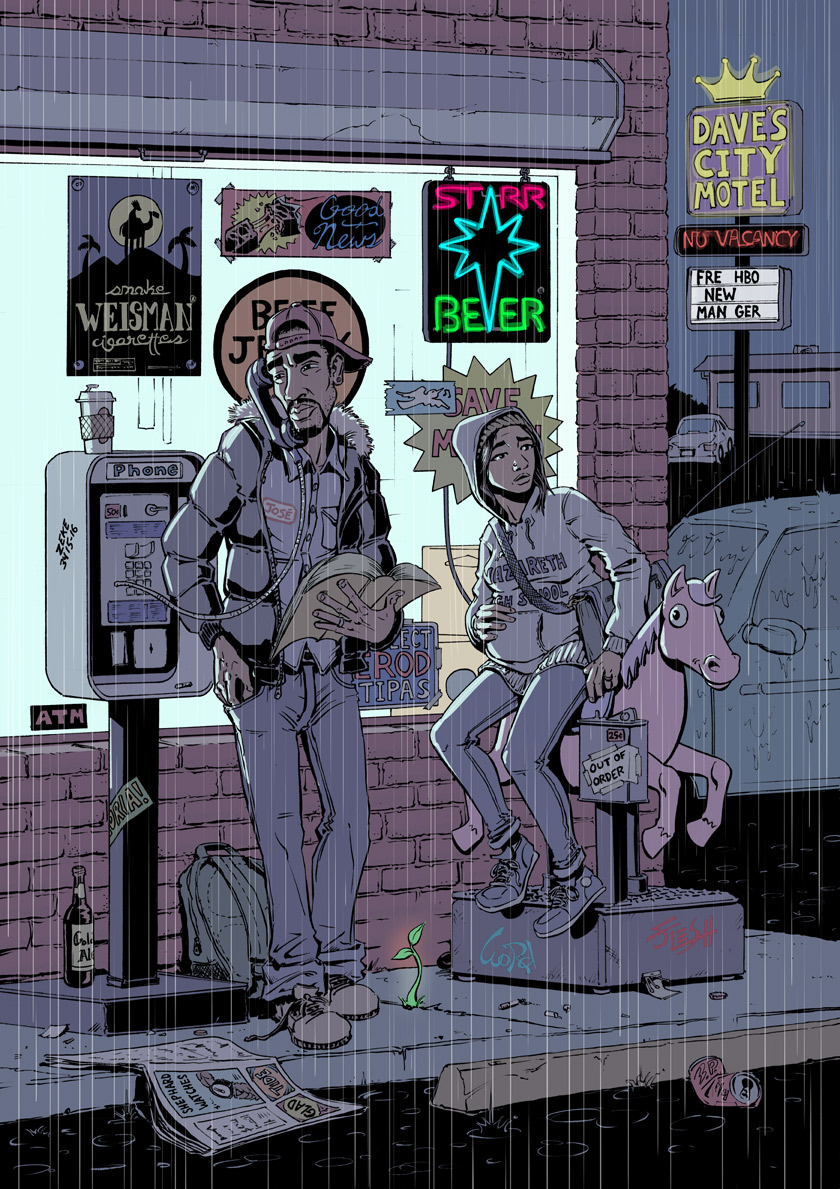Emmanuel. God with us. It’s such a simple statement, one that we hear every year, and it can be easy to forget the incredible beauty it contains. And what it can teach us about what it means to follow Jesus and to proclaim his lordship.
Imagining the God as a human always reminds me of the Genie in Aladdin: “Phenomenal cosmic power, itty bitty living space.”

That God was willing to become human is amazing. But even more amazing is the kind of human God became. Most Jewish people alive with Jesus were expecting God to be a conquering and triumphant king. They were waiting for God to show up and make the Roman emperor his foot stool. Jesus could have had power and riches and prestige and privilege beyond our understanding.
But instead, he was born to an unmarried teen girl in a barn. His birth was lauded by one of the least respected types of people alive then (shepherds), and he quickly became a refugee in a strange land. By the time Jesus grew up he was a homeless wanderer that was publicly executed in the nude by someone who knew he was innocent.
In Philippians, when he wrote down what it meant for Jesus to be human, Paul described Jesus as having given up his privilege in order to become a slave and die a criminals death. The image that Paul drew for us is very different than the Jesus we see in our culture most often.
He was less this:

and more this:

I grew up learning about Jesus’s life, death, and resurrection through a spiritual lens only. However, understanding the political and socio-economic circumstances of Jesus’s life have helped me better understand some of the things he said and the things others said about him. And they have forced me to ask how I can live more justly in the ways that He desires.

Jesus began life as a refugee in a colonized nation amongst poor and oppressed people.
When I imagine where Jesus would have experienced similar circumstances if he had been born now instead of 2,000 years ago, I think it would be someplace like Syria, N. Korea, Myanmar, or Sub-Saharan Africa.
These are all cultures that have been abused and marginalized by modern-day Babylons like America, Europe, and China. They are full of families that are poor, sick, and dying. The Bible does not tell us a lot about Jesus’s childhood, but we know the Jewish people were offended by their Roman overlords. We know Joseph and Mary began their marriage in scandal. We know they lived as refugees with Jesus for a time. And we have good reason to suspect they were always poor.
Understanding the context of Jesus’s birth helps me understand Mary’s reaction to the news that her son would reign over Israel forever. Mary sang a song about God showing mercy to the poor and hungry:
His mighty arm has done tremendous things!
He has scattered the proud and haughty ones.
He has brought down princes from their thrones
and exalted the humble.
He has filled the hungry with good things
and sent the rich away with empty hands. Luke 1:51-53
Before Jesus became known throughout Israel, there was John the Baptist. A guy that lots of people thought was crazy, but he was preparing the way of the Lord and heralding the coming of the Kingdom of God. The Good News that he was preaching to his kinsmen and neighbors?
Prove by the way you live that you have repented of your sins and turned to God. Don’t just say to each other, ‘We’re safe, for we are descendants of Abraham’…
The crowds asked, “What should we do?”
John replied, “If you have two shirts, give one to the poor. If you have food, share it with those who are hungry.”
Even corrupt tax collectors came to be baptized and asked, “Teacher, what should we do?”
He replied, “Collect no more taxes than the government requires.”
“What should we do?” asked some soldiers.
John replied, “Don’t extort money or make false accusations. And be content with your pay. Luke 3:18-14
John’s version of the Good News had very little to do with escaping earth and getting to safety in heaven. Instead he was demanding generosity, honesty, and contentment in order to promote justice and righteousness.
Jesus, too, spoke about the ways the Gospel was Good News to the poor, marginalized, and oppressed.
He began his public ministry with these words:
The Spirit of the Lord is upon me,
for he has anointed me to bring Good
News to the poor.He has sent me to proclaim that captives will be released,
that the blind will see,
that the oppressed will be set free,
and that the time of the Lord’s favor has come.” Luke 4:18-19
In Luke 6, Jesus gave some warnings to people that are rich, prosperous, and popular. Then he gave words to comfort the poor, hungry, and hopeless. If I’m honest, I identify a whole lot more with rich and powerful than I do the poor and hungry in that passage.
What sorrow awaits you who are rich, for you have your only happiness now.
What sorrow awaits you who are fat and prosperous now, for a time of awful hunger awaits you.
What sorrow awaits you who laugh now, for your laughing will turn to mourning and sorrow.
What sorrow awaits you who are praised by the crowds, for their ancestors also praised false prophets.
Every Christmas I’m reminded that God shed his power and privilege in order to bring justice and righteousness to all of us.
How do we combine and integrate our power, privilege, and prosperity with the message that Jesus brought Good News to the poor? How do we live in a way that leverages and/or forsakes our privilege in service to others, the same way Jesus did?
I think Jesus knew that the Gospel would be a stumbling block for many people. We are drawn to wealth and influence. We naturally avoid the grime and underbelly of our cultures and economic systems. I think Jesus knew we would have trouble denying our comfort in order to share it with others. I think that’s why he identified so blatantly with “the least of these” in Matthew 25.
He was one of them. Literally.
How we treat the marginalized, forgotten, and abused today is how we would have treated Jesus in Galilee 2,000 years ago.
So, as we wait for His glorious return and the consummation of his kingdom, I will try to remember that I worship the God-Man that was
- oppressed for his race
- poor and wandering
- abandoned by his friends and family
- a victim of capital punishment
and that he gave up his privileges in order to lay down his life for all of us. And that he calls me to do the same.
- How to Love Your Country Without Going Too Far - March 7, 2021
- 3 Ways to Raise Your Race IQ - February 17, 2021
- 5 Black Heroes That History Forgot - February 11, 2021
